Editor’s note: The following is extracted from Jungle Warfare with the Australian Army in the South-West Pacific (published 1944).
To all outward appearances Steve Connors was just the same as a thousand others who had carried their rifles and their Brens, their Owens and their mortars up the Ramu and into the rugged battlements of the Finisterres. There was nothing to distinguish him now from any of the little band of men struggling up the heartbreaking slope to the crest of the ridge. His boots and gaiters were almost invisible through the thickly-coated mud, and his ragged green shirt and trousers were dark with sweat. On his back was his haversack with his sodden half-blanket and groundsheet rolled beneath it. The inevitable slouch hat, battered and shapeless, completed a typical jungle infanteer.
But, though Steve Connors was living, eating and fighting with his mates, he existed in a world apart, and his eyes, in confirmation, stared straight ahead vacantly. He had no more interest in his surroundings than an automaton.
His comrades, closer to him than anyone, had noticed the change in him. No longer was he the Steve they had known and fought with. They could recall many a tough spot when Steve’s dry humour and fatalistic nonchalance had eased their ragged nerves and given them new heart. But not now. There had been something in his bearing in those last two brushes with the Jap that had sown the seed of doubt in their minds. They had begun to think he had lost his nerve.
One by one, as they reached the ridge, they threw themselves on the ground, thankful that their long climb was completed. In front of them the ground fell away into another valley, then up again to a higher ridge that seemed but a stone’s-throw away. Tall timber and thick undergrowth clothed the crest where they lay, but farther down it thinned to open kunai on the valley floor.
When they had rested they began to prepare their evening meal— if the opening of a tin could be called preparation.
As they ate the officer in command, a young lieutenant named Weatherley, spread out a map on the ground and began to outline their mission.
“Corporal Connors,” he said, “I want you to take particular note of what I am going to say and study this map carefully. You’ll know the reason later.
“Now, this is the picture,” he commenced. “Patrols from ‘A’ company have covered this area to the valley ahead of us,” indicating the positions on the map as he spoke. “Our job is to continue from there to this oval-shaped knoll here. All being well that should take us about eight days. This first valley, however, is our main obstacle. Owing to this line of cliffs, the only way to get to the bottom is down this gully and across that kunai patch. That’s the way ‘A’ company tried to go.” He paused here to take a mouthful of food. He masticated slowly then continued, “They were cut to ribbons by guns concealed somewhere up the valley.”
He paused again, this time to allow his words to sink in. “We think they have two heavy machine guns, woodpeckers, but we don’t know where they are sited. Obviously our first job is to locate and destroy those gun positions. Just as obviously it has to be done by stealth and not by storm.”
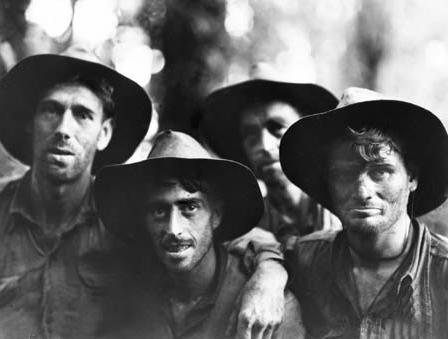
The men looked at him expectantly. They liked this young-old leader of theirs and respected his judgment.
“So,” he went on, “I am sending you, Connors, with three others you will pick from your section, to do that first important job. You will leave at first light. Are there any questions?” He finished, and looked around at the lean unshaven faces about him. There were no questions. Steve Connors studied the map with very little show of interest or enthusiasm. Disinterestedly, too, he picked three men to accompany him.
The light faded and the hush of the jungle-night cloaked everything. The men sat around for a while discussing the job in hand, very much in the same way as they would discuss next week’s races. Gradually the murmur of voices died away as, one by one, they settled down to sleep, while around them the watchful eyes of the outpost sentries strained to pierce the darkness.
When the sun came up, tipping the ridges and peaks with silver, Steve Connors and his three companions were already picking their way down the gully They were in semi-twilight, as the valley was still deep in shadow and the thick foliage roofing the creek bed let little light through.
The rest of the patrol had wished them luck, and watched them till they were out of sight, then settled down to wait. They were all wondering about Steve Connors though they said nothing.
They had gone about an hour and a half when the men on the ridge started up as the slow stutter of a woodpecker echoed up from the valley floor. Another gun joined its rattling song. Then they stopped and the silence was deep and sudden. All eyes turned to the officer. He looked at them and quietly answered their mute question. “We’ll give them till midday.”
The hours dragged by. Then, ten minutes before noon, a solitary figure staggered out of the head of the gully. As he came up to them they saw it was Steve Connors. His hat was gone and on top of his head the dark hair was matted by something darker. His eyes were still blank.
Someone cut away the hair from the wound on his head and bandaged the shallow score left by a heavy-calibre bullet. It was not a bad wound. The skin was barely broken. Slowly and listlessly he told his story.
He had decided to cross the kunai patch in extended line so as to present four small moving targets instead of one compact one. That had seemed the best plan to him. But he had not been prepared for the blast of close-range fire that had swept them when they had barely left the gully. Luckily he had only been creased and had managed to crawl back to cover.
“What about the others?” a voice asked. “I could see them,” Steve answered. “They didn’t move.”
Somehow the barrier between Steve and his comrades seemed to have become greater. They felt that his plan for crossing the kunai had been hopelessly unimaginative. They blamed him for the death of his three companions. Steve did not seem to care. He sat and gazed unseeingly across the valley.
Twenty minutes later, from the direction of headquarters, a sweating panting figure, with a bulky bag over his shoulder, reached the crest of the ridge. The magic word “Mail” ran like a ripple from lip to lip, and the men leapt to their feet and crowded around the newcomer. “You beaut, Shorty, open her up.” “Any for me, Shorty?” “Any parcels?”
From every side Shorty Jameson was bombarded with eager questions. The men, their eyes alight with anticipation, almost overran the little mail-orderly in their excitement. They could barely refrain from snatching the bag from his hand.
Shorty, coolly unconcerned, put the bag on the ground and sat on it.
“Now, until all you blokes get back and give me some air, I’m sitting on this bag and you’ll never get your so-and-so mail,” he threatened. As if by magic the crowd backed off a good six inches. Shorty was apparently satisfied with this as he rose to a kneeling position and tipped the bag’s precious contents out on to the ground.
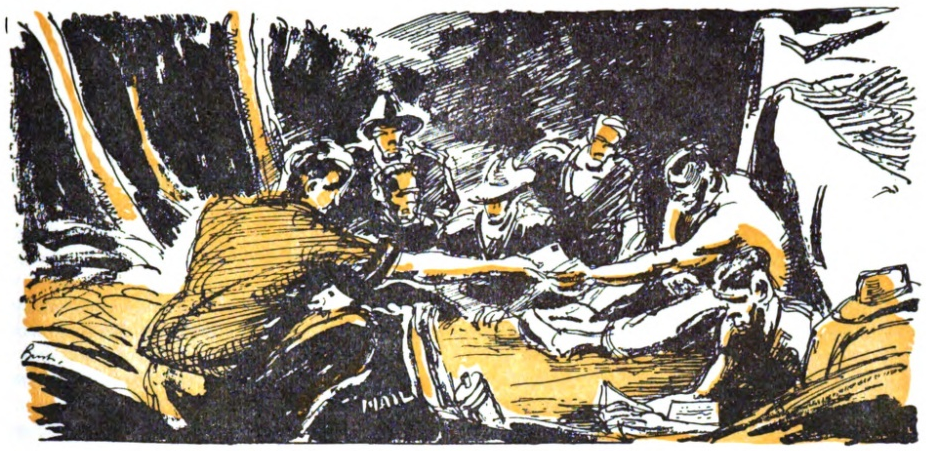
Bundle by bundle he sorted them, calling the names, and handing the letters out. On the outskirts of the crowd was Steve Connors. The pile of letters dwindled until only one small bundle remained, and the name Connors had not been called. With a hopeless expression on his face Steve turned away. He had gone a few paces when he was halted by Shorty’s voice calling, “Connors, S. J. Anyone take Connors’s mail?”
“Here!” called Steve, and was back in a flash, almost snatching the telegram from Shorty’s hand. Eagerly he ripped the envelope open and scanned the short message. He read it again and slowly a smile lit up his gaunt features and he laughed aloud. His shoulders drew back and his back straightened visibly. Ignoring the curious glances of his mates, Steve strode over towards the officer, stuffing the precious scrap of paper in his pocket as he went. He was not smiling now but his eyes gleamed.
The officer looked up from the letter he was reading as Steve approached.
“Yes, Connors,” he said. “What is it?”
“Sir,” Steve answered, “I’d like permission to have another crack at those woodpeckers. Alone.”
Lieutenant Weatherley studied Steve in silence. This man before him was something like the old Connors. He felt strangely confident as he replied quietly, “Righto, Corporal, you have my permission.”
For the second time that day Steve set off down the gully. Before leaving, he had equipped himself with four grenades as well as his Owen gun. As he hurried down the rocky creek bed he was thinking quickly. How was he to cross that kunai patch? And once across then what? He tried to remember the details of the morning’s tragic attempt as he made swift mental calculations as to the direction from which the fire had come.
Despite his furious thinking he had no plan made when he reached the point where the gully opened out on to the kunai. He saw the bodies of his mates, still lying where they had fallen, and a fierce anger gripped him. From the cover of a small bush he minutely examined the valley in the direction from which the fire had come. It was easier than he had thought. That big tree about three hundred yards up seemed the only spot the guns could be. He prayed so anyway.
His brain worked swiftly as he studied the approaches to the tree and formulated his plan of attack. Then the way to cross the kunai came to him suddenly. It was so simple he almost laughed. It was risky of course but everything was a gamble these days.
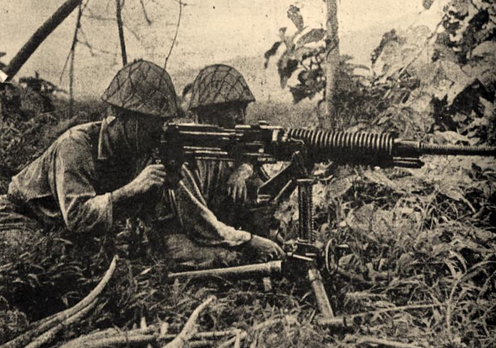
He rose from behind the bush and, with his Owen at the ready, he walked out into the open. He advanced ten yards and nothing happened. Twenty yards. Thirty. Forty. He held his breath. Ten yards to go. He steeled himself for the shock of the bullets. But none came. With a sigh of relief he entered the protection of the trees. The gamble had come off. The Japs behind the guns had taken him for the forward scout of a patrol and even now were squatting behind their weapons ready to open. Swiftly and silently he advanced up the valley, concealed from view by the trees and the thick undergrowth. Speed was essential. He must get there before the Japs realized they had been fooled.
He slowed down. He was getting close now. He heard the strike of metal on metal and he froze. Carefully he parted the bushes with his hands. His judgment had been correct. There, one on either side of the tree, dug in between the roots and camouflaged to perfection, were the two woodpeckers. He thanked God the Japs, in their confidence, had not bothered to roof their gun-pits with logs and earth as they usually did. He edged closer until only a dozen yards separated him from the nearest gun. The Japs were getting impatient now and he could hear them chattering. He took his grenades from his belt and silently laid them beside him. He pulled the pin from one and with a smooth over-arm action lobbed it into the nearest gun-pit. In swift succession the others followed it, two into each position. The valley reverberated to the explosions. Scarcely had the sound of the grenades died away when Steve was in the open, his Owen spitting a victory song. But it was not necessary. Not a thing stirred in either pit and the guns were twisted, useless metal.
Up on the ridge the officer smiled and the men began to grin and say, “Good old Steve.”
Steve noticed with surprise that the deep shadows were creeping into the valley again. He must hurry to get back before dark.
After collecting any papers that might be of Intelligence value Steve started back down the valley, across the kunai patch, and began to toil up the gully towards the camp. His wounded head was aching and his weary body cried out for rest, but his heart was singing. He paused a minute and took the telegram from his pocket. He could barely see the words in the fading light. As he returned it to his pocket he grinned and went on his way whistling.
After all, it wasn’t every day a man became the father of twins.

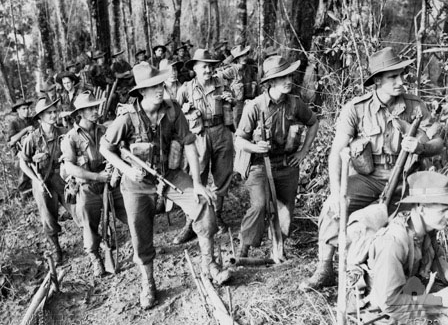

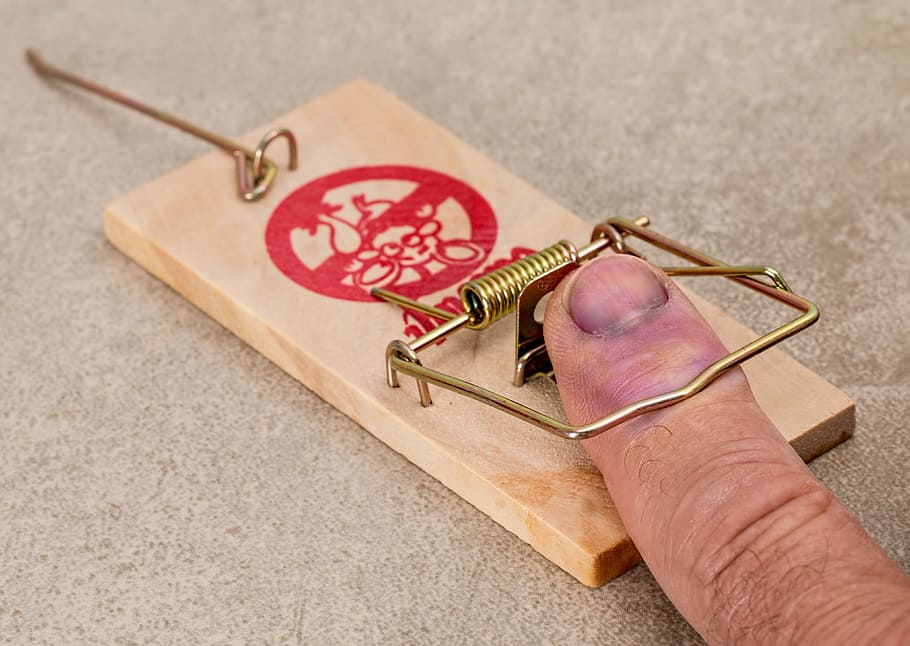






My maternal grandfather was an infantryman on the Kokoda track. So thanks for posting this.
These men saved Australia from Japanese invasion. Their valor and sacrifice must never be forgotten.
Fantastic. Good to know you are of good mettle.
An outstanding account, and beautifully composed.